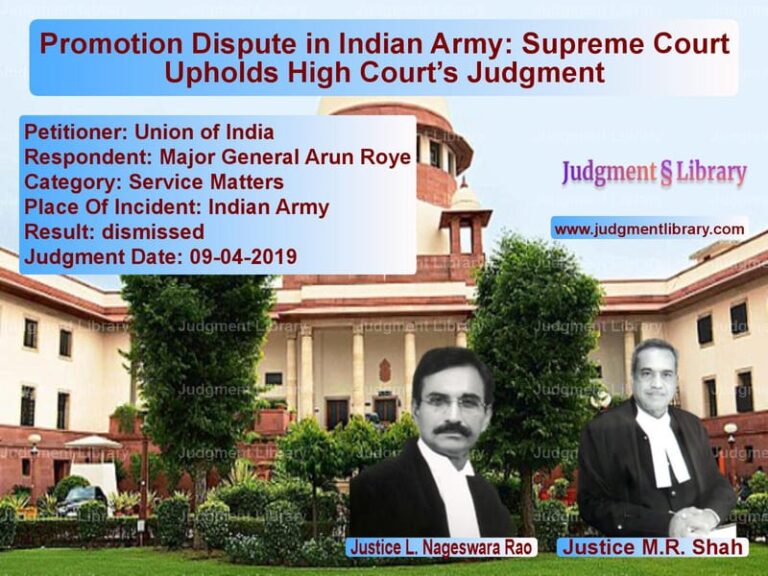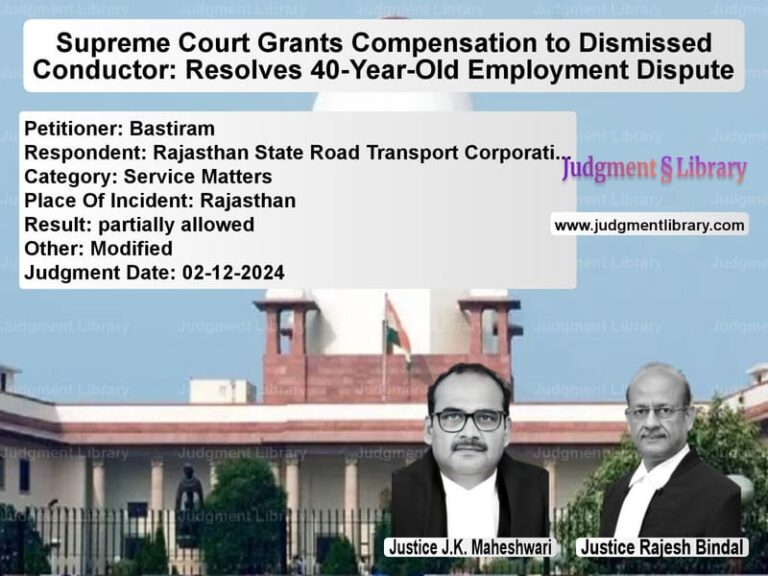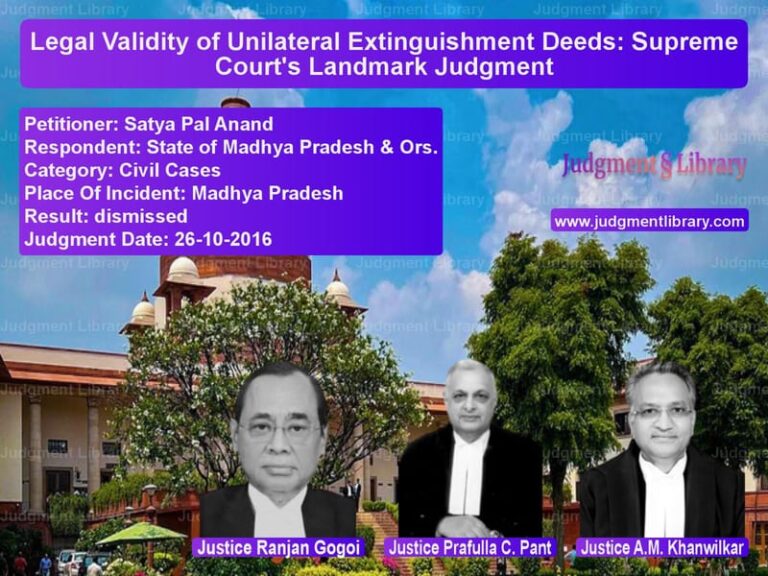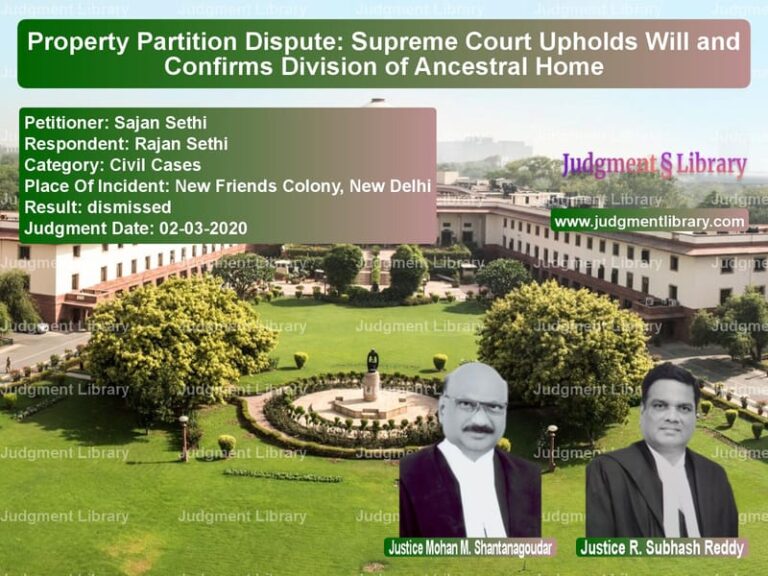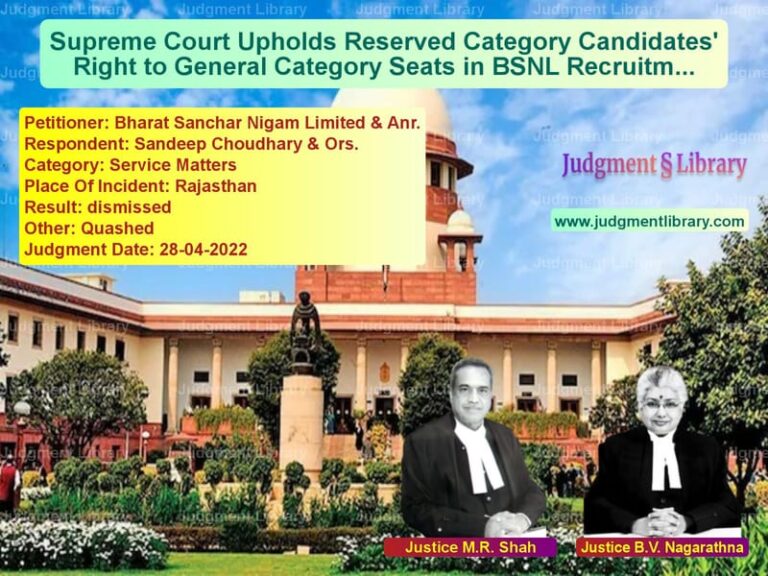Caste Certificate Dispute: Supreme Court Upholds District Vigilance Committee Decision
The case of J. Chitra v. District Collector and Chairman, State Level Vigilance Committee, Tamil Nadu & Others concerns the cancellation of a caste certificate and the scope of the State Level Scrutiny Committee’s authority to review decisions that have already been finalized. The Supreme Court ruled in favor of the appellant, J. Chitra, setting aside the cancellation of her caste certificate.
Background of the Case
The dispute began when Dr. Ambedkar Service Association raised doubts about the caste certificate submitted by J. Chitra at the time of her employment. The caste certificate, issued in 1985, identified her as belonging to the Valluvan community, a recognized Scheduled Caste in Tamil Nadu. The complaint led to an inquiry by the Chennai District Vigilance Committee, which initially upheld the validity of her caste certificate in 1999.
Despite this, another complaint was filed in 2003, leading to a fresh investigation by the State Level Scrutiny Committee. This committee remanded the case to the District Vigilance Committee, which then cancelled the appellant’s caste certificate on April 9, 2008. Chitra challenged this decision in the Madras High Court, but her petition was dismissed on December 22, 2008. She then appealed to the Supreme Court.
Key Legal Issues
- Did the State Level Scrutiny Committee have the authority to re-examine a caste certificate that had already been upheld by the District Vigilance Committee?
- Was the cancellation of the appellant’s caste certificate justified?
- Does the repeated verification of caste certificates violate principles of fairness and administrative finality?
Arguments by the Petitioner (J. Chitra)
The petitioner, J. Chitra, presented the following arguments:
- The District Vigilance Committee had already verified and upheld her caste certificate in 1999, and there was no legal basis for re-examining the same issue.
- The State Level Scrutiny Committee exceeded its jurisdiction by remanding the case for a fresh inquiry.
- As per the Supreme Court’s ruling in Kumari Madhuri Patil v. Addl. Commissioner, Tribal Development (1994), caste certificates once verified cannot be repeatedly questioned unless fraud is established.
- The Tamil Nadu Government’s Government Order (G.O.) No. 108 (2007) explicitly states that cases verified by District Vigilance Committees cannot be reopened by the State Level Scrutiny Committee.
Arguments by the Respondents (State of Tamil Nadu)
The respondents, represented by the Tamil Nadu government, argued:
- The caste verification process required multiple levels of scrutiny to prevent false claims of Scheduled Caste status.
- The reconstitution of the District Vigilance Committee in 2005 and subsequent government guidelines allowed for a fresh examination of earlier decisions.
- The District Vigilance Committee’s decision in 1999 was not final because caste certificate fraud cases must be subject to continuous verification.
- The appellant failed to provide sufficient documentary proof of her Scheduled Caste status.
Supreme Court’s Observations
The Supreme Court carefully reviewed the procedural history and relevant legal precedents before making the following key observations:
- The District Vigilance Committee had already upheld the appellant’s caste certificate in 1999, and this decision remained unchallenged at the time.
- The State Level Scrutiny Committee exceeded its powers by remanding the matter for fresh inquiry despite no new allegations of fraud.
- As per the ruling in Dayaram v. Sudhir Batham (2012), caste verification committees are administrative bodies and cannot repeatedly reopen cases that have been settled.
- “The guidelines issued by G.O.108 dated 12.09.2007 do not permit the State Level Scrutiny Committee to reopen cases which have become final.”
- Repeated verification of caste certificates creates undue hardship for genuine Scheduled Caste candidates and undermines administrative efficiency.
Supreme Court’s Judgment
The Supreme Court ruled in favor of the petitioner and:
- Set aside the District Vigilance Committee’s April 9, 2008 order cancelling the caste certificate.
- Declared that the State Level Scrutiny Committee had no authority to remand the case for fresh inquiry.
- Reaffirmed that caste certificates, once verified and upheld, cannot be repeatedly challenged unless fraud is established.
Key Takeaways from the Judgment
- Finality in Caste Verification: Once a caste certificate has been validated by a competent authority, it cannot be repeatedly questioned.
- Jurisdictional Limits: The State Level Scrutiny Committee cannot reopen cases unless fraud is suspected.
- Protection Against Harassment: The ruling protects genuine Scheduled Caste candidates from undue verification procedures.
- Government Orders Must Be Followed: The Supreme Court upheld the Tamil Nadu Government’s G.O. 108 (2007), which prevents repeated scrutiny of caste certificates.
- Judicial Precedents Apply: The Court reaffirmed the principles set in Kumari Madhuri Patil (1994) and Dayaram (2012).
Conclusion
The Supreme Court’s decision in J. Chitra v. District Collector and Chairman, State Level Vigilance Committee, Tamil Nadu provides a crucial precedent on the finality of caste certificate verification. It ensures that individuals who have already undergone scrutiny and had their caste status confirmed cannot be subjected to endless rounds of re-examination. This ruling not only upholds the rule of law but also prevents the misuse of verification processes to harass genuine beneficiaries of affirmative action policies.
Petitioner Name: J. Chitra.Respondent Name: District Collector and Chairman, State Level Vigilance Committee, Tamil Nadu & Others.Judgment By: Justice L. Nageswara Rao, Justice Aniruddha Bose.Place Of Incident: Tamil Nadu.Judgment Date: 01-09-2021.
Don’t miss out on the full details! Download the complete judgment in PDF format below and gain valuable insights instantly!
Download Judgment: j.-chitra-vs-district-collector-a-supreme-court-of-india-judgment-dated-01-09-2021.pdf
Directly Download Judgment: Directly download this Judgment
See all petitions in Employment Disputes
See all petitions in Public Sector Employees
See all petitions in Recruitment Policies
See all petitions in Judgment by L. Nageswara Rao
See all petitions in Judgment by Aniruddha Bose
See all petitions in allowed
See all petitions in Quashed
See all petitions in supreme court of India judgments September 2021
See all petitions in 2021 judgments
See all posts in Service Matters Category
See all allowed petitions in Service Matters Category
See all Dismissed petitions in Service Matters Category
See all partially allowed petitions in Service Matters Category


